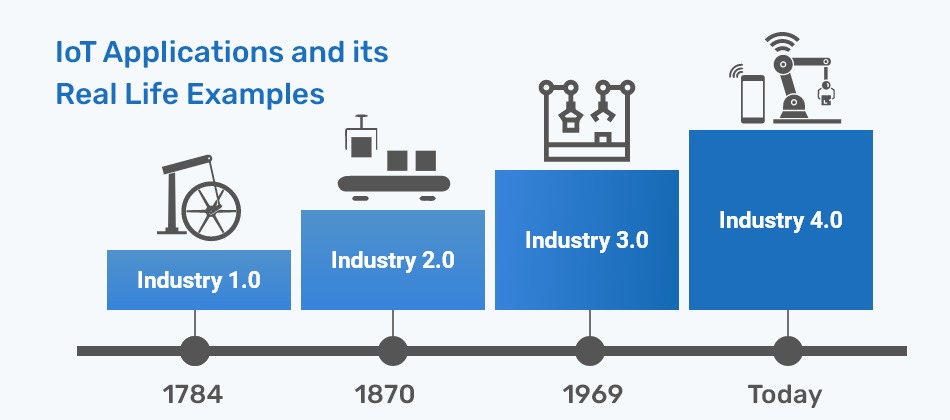
Internets of Things (IoT) applications are becoming the need of the hour. According to Statista, worldwide expenditure on IoT in 2022 is expected to be around 1B.
This brings a variety of business applications. Knowing these IT examples and Use cases can help businesses IoT technologies in their future investment decisions. This is the reason why we set out to create a comprehensive list of IoT use cases in Industries.
In this blog of B2C Info Solutions the leading app development company having diverse industry experience, we will provide Real Life IoT Applications and their used cases.
So let’s start
1. Connected Vehicles- Autonomous vehicles are one of the most notable examples of IoT in Action. Self-driving cars and trucks use a slew of connected devices to safely navigate roadways in all sorts of traffic and weather conditions. The technologies in use include AI Enabled Cameras, motion sensors, and onboard computers.
IoT connections also exist on conventional vehicles, with manufacturers installing connected devices to monitor performance and manage computerized systems.
Commercial fleets such as municipal buses and corporate delivery trucks fitted additional IoT Technologies such as connected systems to monitor for safety issues. Personal cars and trucks can be fitted with similar technology, which frequently comes from insurance companies that collect and transmit telemetry data to verify good driving habits.
2. Traffic Management- Roadway infrastructure has become more connected in the last decade as well, with cameras sensors, lighting light controls, parking meters, and even smartphone traffic apps transforming data then used to help avert traffic jams, prevent accidents and ensure smooth level.
For example, cameras detect and transmit data about traffic volume to central management groups that can then analyze the information to determine whether, what, and when mitigation steps must be taken.
3. Smart grids- Utilities are also using IoT to bring efficiency and resiliency to energy grids. Historically, energy flowed one along the grid: from the generation site to the consumer. However, connected devices now enable two-way communication along the entire energy supply chain from generation through distribution to use, thereby improving the utility's ability to both move and manage it.
Utilities can take and analyze real-time data transmitted by connected devices to detect all the blackouts and redirect distribution, as well as respond to changes in energy demand and load.
4. Environmental Monitoring- Connected devices can IoT can collect data that indicates the health and quality of air, water, and soil as well as fisheries, forests, and other natural habitats. They can also collect weather and other environmental data.
As such, IoT delivers the ability to not access significantly more real-time data about the environment at any given place but also enables a range of organizations in various industries to use that data to glean actionable insights.
5. Smart Buildings and Smart Homes- Property owners are using the power of IoT to make all sorts of buildings smarter, meaning they’re more energy efficient, comfortable, and convenient, as well as healthier and possibly safer, too.
An IoT ecosystem in a commercial building could include monitoring of the HVAC infrastructure that uses real-time data and automation technologies to constantly measure and adjust the temperature for optimum energy efficiency and comfort. Meanwhile, cameras using AI could aid in crowd management to ensure public safety at events such as Sold-out concerts.
6. Supply Chain Management- Supply Chain Management has been under modernization, thanks to power lower sensors, GPS, and other tracking technologies that pinpoint assets as they move along a supply chain. Such information lets managers both effectively plan and more confidently reassure stakeholders about the location of items shipped or received.
7. Industrial, Agricultural, and Commercial Management- IoT has numerous applications in industrial and commercial settings, enabling everything from predictive maintenance to improved security at facilities to smart agriculture. These wide-ranging use cases employ an equally expansive list of technologies.
Final Words
Although there are some industry-specific IoT use cases, many of the most common deployments involving connected technologies transcend any particular vertical and can be found across various organizations.
To know more about it connect with our experts at info@b2cinfosolutions.com.




